The Philosophy of the Animal Kingdom
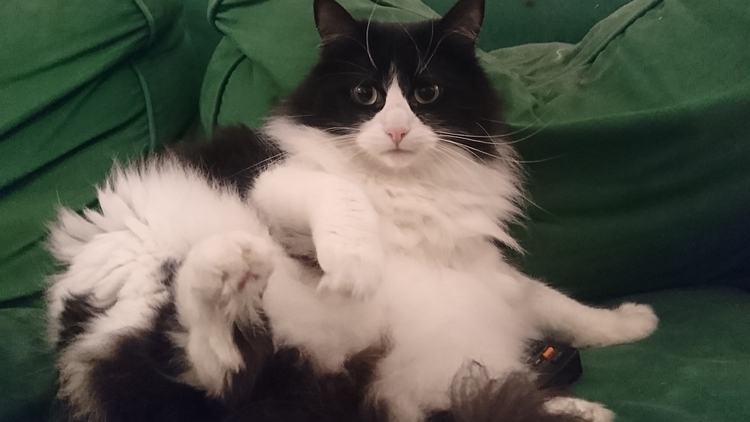
Featured image: Jess, a housecat, in her natural habitat. Jess continually inspired me as I wrote my MA Philosophy dissertation on animal agency, housebound with a broken foot. I watched her 'think', 'learn', and 'determine' courses of action with semblances of free and conscious reflection. But there was also a strong sense that her 'decisions' were being made randomly by external forces. Will this thwart our love?
In the unequivocally held scientific opinion we are the products of natural selection. We gradually and continuously evolved from ‘lower’ beings, our DNA mutating and diversifying according to natural laws. Evidence suggests that we diverged from chimpanzees and bonobos somewhere between five and seven million years ago. Rather remarkably, human beings went on to commandeer the planet, as a fully fledged species, at the Dawn of Man.
We are self-aware, rational, deliberative, purposive, and communicative: these and other abilities enable us to consciously reflect on what we want and intelligently find means to attain it. Through biology, medicine, psychology, philosophy, history, anthropology, and a whole host of other dedicated subjects, we have come to learn a great deal about ourselves.
However, there is a great deal to learn about lower creatures, too. So what I want to explore in this article—and what I find particularly interesting—are the concepts we ordinarily use to describe human minds and apply them to the minds of non-human animals.

The Cat and The Hat: Jess, a partner at The Human Front, regularly seeks attention from me. Does she enjoy preventing me from working? Her role is currently being reviewed by the Committee.
We so often assume so little of the non-human mind as we cage, transport, consume, and exploit animals and keep them as pets; perhaps there is a lot more going on ‘in there’.
How conscious are they? Do they suffer? How do they form thoughts? And, accordingly, what rights should we afford them? In this article, with the actual wisdom of an owl and the genuine humour of a hyena, I have examined some fascinating human concepts—consciousness, free will, cognition, and love—and taken them on a detour to the animal kingdom. Jess, The Human Front’s mascot, has joined us.
Consciousness
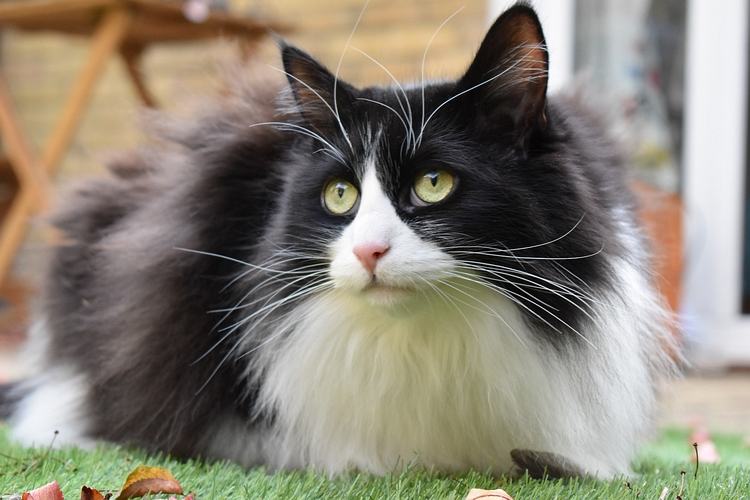
Wittgenstein on Jess: Assuming Jess can form conscious ideas of things, can I come to understand what they are? Let's assume Jess uses a language. Not everyone can understand it. Perhaps it comprises attitudes that can be represented as such: 'Those pigeons are antagonising me' or 'No, not that one; I want my favourite food'. Can I come to understand what she means? According to (early) Ludwig Wittgenstein, deciphering Jess is fundamentally difficult. The world is a 'totality of facts, not of things', that we attempt to capture in thought and language. But, even at the best of times, language communicated between humans fails to guide the correct meaning in the flow of information, ambiguating thoughts and ensuring feelings remain elusive and ineffable. The logic required to express thought in language is constraining and its symbols and connectives only service the facts if the correct meaning is conveyed. So even if Jess wasn't totally illogical—which, to be honest, she is most of the time—her world, as perceived by her senses, is full of entirely different meanings to mine that may not convey her intentions properly. How frustrating, then, must life be for her! Indeed, much of my time is spent trying and failing to understand her intentions as I search for a shared world—of similarly perceived shapes, colours, depths, textures, tastes, smells, and sounds—wherein we can truthfully communicate. For example, she sometimes yells at a door, which I usually take as, 'Throw me a treat' (obviously): whereof one cannot speak logically, thereof one is destined to yell! But, actually, I think she means, 'Clean my cat litter; I'm not pissing in there,' and gets mad at my misinterpretation. Sadly, then, there is probably no shared world for us to coexist in. Definitely there is no shared world wherein she attempts to understand me [sad face]. But [consoled face] this might not be her doing; rather, it's a fundamental problem with language! As (later) Wittgenstein put it: even 'if [Jess] could speak, we could not understand [her]'; she plays a different 'language game' to me.
Consciousness is described as the state of being ‘aware’ of external objects in one’s mind. More generally, it’s a mental experience of some sort. Every non-human animal (shortened to ‘animals’ hereafter) has a body but not every animal has a mind (e.g. sessile sponges), at least in the way we usually construe ‘mind’.
An animal’s conscious state may include, if the animal is sophisticated enough, sentience: the capacity to feel, perceive, and experience the world, perhaps subjectively.
The level at which animals think consciously is clearly on a spectrum. While some organisms, such as unicellular paramecia, function in very basic ways to move and reproduce without thought, other organisms, such as Asian elephants, remember things, communicate with one another, recognise themselves, and possess mental states that resemble those of the human mind.
The endeavour to understand animal consciousness is scientific and philosophical in nature: we scientifically study animals such that we can characterise how they behave, which provides an empirical window of possibility for us to ask our philosophical questions. But while we can easily observe and predict courses of action animals take, say in some pursuit of zoology or animal psychology, we cannot necessarily know what they are thinking or even necessarily prove that they are thinking, even if it seems obvious. Nonetheless, since we probably share an evolutionary history with animals, it follows that animals—especially those who possess brains—have mental properties which are similar to ours in some ways.
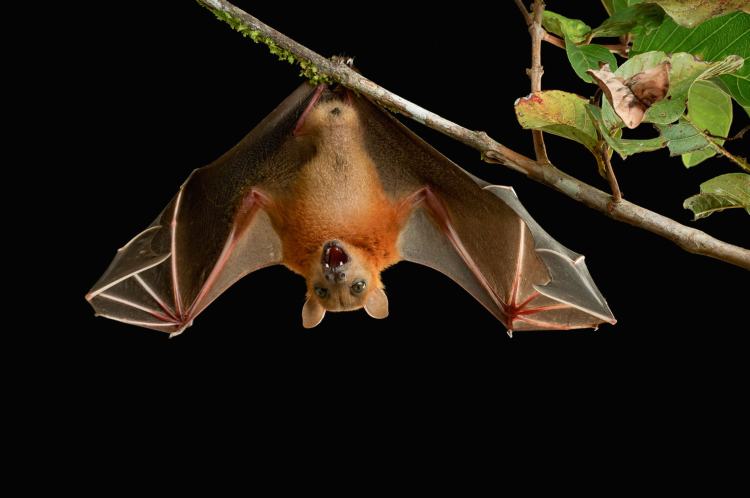
Batman? Thomas Nagel asked: 'What Is It Like to Be a Bat?' With this question Nagel investigated the 'hard problem of consciousness' (how non-physical subjectivity is lit up by physical states) and concluded that the physical sciences cannot fully capture first-person, phenomenological subjectivity in third-person objectivity (e.g. with causal mechanisms, functions, reductions, and so forth). Facts about experience are tied to a point of view and, epistemically, we cannot know what it's like to be a bat, even if we installed ultrasound, ate insects, webbed our arms, hung upside down, and looked all sassy and stuff—'qualia' which are unique to bats. 'Our own experience provides the basic material for our imagination, whose range is therefore limited.' (Ch'ien Lee, Minden Pictures/Corbis Images)
It is usual for scientists to be tacit physicalists, describing the natural world through physical brain processes. However, they must take an explanatory leap to account for ‘phenomena’ (immaterial experiences in the mind’s eye). Equally, it is exceedingly difficult to properly explain the mind without accounting for the body which houses it. These unknowns constitute both sides of the ‘mind-body’ problem: together, how do we relate mental properties to physical properties?
Can we, at least, claim animals do, in fact, experience? For they seem to express things like fear and joy through sounds and body language, which points to some underlying features of mental experience.
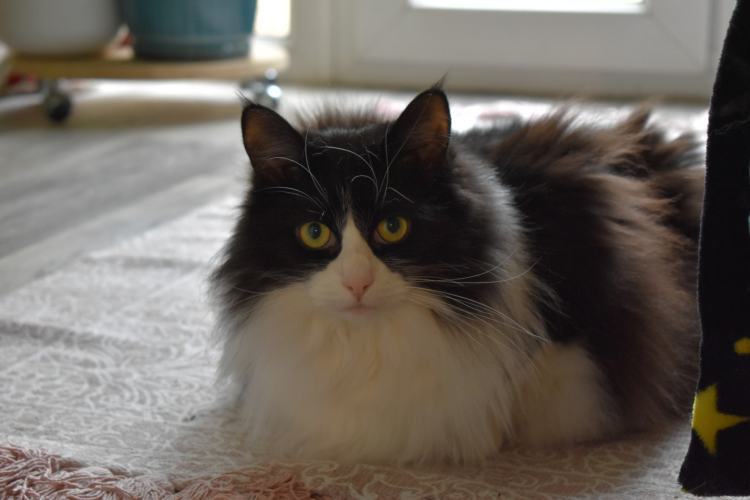
Jess' rights: What are the criteria for a creature to be given real, legally recognised rights? They have far fewer than us, presumably premised on some idea of their lesser-quality experiences. A number of philosophers have put forward opinions on the subject. Immanuel Kant, an 'exceptionalist', claimed only humans should be considered to have moral worth because we uniquely face the problem of normativity. With our reasoning powers only we can deploy reason for good: 'The fact that the human being can have the representation "I" raises him infinitely above all the other beings on earth' … that is, a being altogether different in rank and dignity from things, such as irrational animals, with which one may deal and dispose at one's discretion.' Unlucky, Jess; I have no direct duty to you. Worse for Jess, René Descartes believed animals to be automas with no possession or thoughts or feelings at all: '[A]ll the things which dogs, horses, and monkeys are made to do are merely expressions of their fear, their hope, or their joy; and consequently, they can do these things without any thought.' But I hear Jess' piercing screams when she's hungry and her unignorable wails when she's bored; surely, there are thoughts in that troubled mind. Good news: Jeremy Bentham and Peter Singer can save her. Bentham, a big-time utilitarian, said: '[T]he question is not, Can they reason? Nor, can they talk? But, can they suffer?' And, judging by those screams and those wails, Jess can't reason or talk but she can suffer! Singer, another utilitarian and one of my inspirations for being vegan, wrote, through his deconstruction of 'speciesism': 'If possessing a higher degree of intelligence does not entitle one human to use another for his or her own ends, how can it entitle humans to exploit non-humans?' And, more emotively: 'We have to speak up on behalf of those who cannot speak for themselves.' Singer does, however, argue that it's okay to consume bivalves (oysters, mussels, clams, etc.) because they're not sentient, a position which Descartes fuzzily applied to all animals whilst tacitly acknowledging their conscious states and undermining his own position. Either way—sorry, bivalves; I can't save you, though I won't consume you. But I shall speak up for you, Jess, you vaguely sentient beast.
Some philosophers, of the ‘illusionist’ persuasion, believe that it’s correct to say animals mentally experience things in a conscious way but that we cannot grant them the special property of phenomenal consciousness or ‘qualia’. This is because lower animals lack the mental states which facilitate qualitative judgements from subjective standpoints (e.g. meta-judgements). As I saw Keith Frankish say about dogs recently on Twitter: ‘Do dogs think they have qualia? No. Do they have states similar to those that make us think we have qualia? Probably.’
Other illusionists, however, might make a similar charge against these special kinds of experiences in humans: that is to say, we misrepresent the nature of our inner experiences with false representations of ourselves.
The debate rages on.
Rudimentary free will
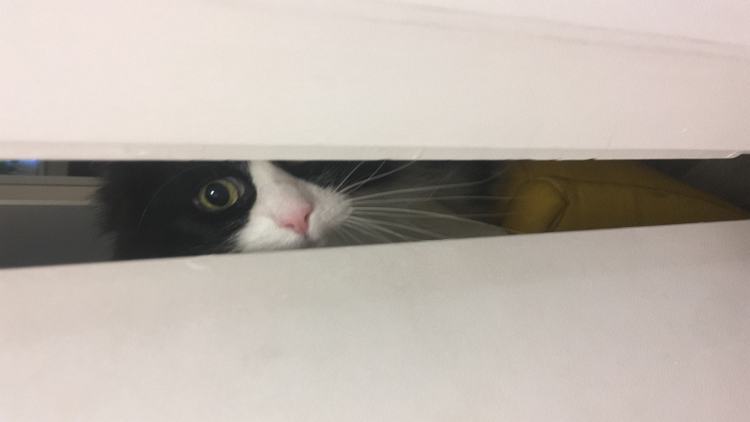
Bothersome: Does Jess choose to be annoying (here by attempting escape and stopping me from bringing in the shopping)? If she does, I'd be upset but it would imply I can fairly punish her. After all, she freely chooses to perform annoying actions, which just isn't always forgivable after a long, tiring day.
Taking the idea of illusionism one step further, it is also plausible that free will in humans is an illusion. If true, this would entail that we do not control our choices (e.g. because our decisions are governed by natural laws ‘beneath’ our decision-making).
In animals the definition of free will has to be slightly amended if we are to understand how free they are in making choices. Given their less-complex minds, we seek the rudiments of free will rather than an ability to conscious assess situations such that we can praise or blame them through moral assessments. We, therefore, move our search from free will to agency, which is the capability of acting above natural causation to make things happen, potentially freeing them from the strings of their instincts.
Helen Steward, in A Metaphysics for Freedom, put forward the following criteria of animal agency:
- The animal can move 'whole, or at least some parts, of something we are inclined to think of as its body'.
- The animal can be 'a centre of some subjectivity'.
- The animal can be attributed 'at least some rudimentary types of intentional state (e.g. trying, wanting, perceiving)'.
- The animal is 'a settler of matters concerning certain of the movements of its own body … i.e. the actions by means of which those movements are effected cannot be regarded merely as the inevitable consequences of what has gone before'.
A concept of agency built on these criteria, in Steward’s view, is ‘a precondition of any non-metaphorical use of concepts like belief, desire, and intention’. So we have to start our search for freedom with agency at the foundation of thought. We can debate till the end of time which animals across the entire animal kingdom pass all four criteria and to what extent. From clams to bonobos, there is clearly a scale on which agency hypothetically emerges, a debate which Steward leaves for others to chomp at.

Sun's out; ants out: Ants in my garden are more likely to make an appearance on my cherry tree where the sun shines. Famed natural historian David Attenborough says in one documentary: 'Using their bodies as solar panels, the ants harvest the sunlight' to transfer their heat to the brood chambers below.' Attenborough's language—with particular regard to the transitive verbs, 'use' and 'harvest'—implies ants hold intentions in their mental states. Similarly, ants join supercolonies to gain competitive advantages over other ants and form mutualistic symbiotic relationships with aphids to farm their honeydew. But is it really right to claim ants can do X for Y? Likewise does Jess really make a 'choice' over her instinct to hunt and kill a harmless, innutritious moth or 'decide' to crash out on my legs when she's tired and crush them (she's pretty thicc)? I worry about an oversubscription of agency to animals in scientific contexts. Nevertheless, philosophers such as Helen Steward offer hope in the idea that there is such a thing as freedom on display in the animal kingdom (and in my house through Jess). (See here for a short discussion of animal agency featuring philosopher Daniel Dennett, earthworms, and thermostats, which arguably possess intentions with respect to the temperatures they 'want'.)
There are big questions about what intention really is and how the mind ‘determines’ matters in an intelligible way ‘above’ the body through top-down causation: can such a theory respect the laws of science, if we must—for example, by obeying conservation laws? This is true in animals and in us.
While I have criticised Steward’s theory, I maintain a high level of respect for it. Moreover, great number of philosophers have expounded viable accounts of animal agency, crossing metaphysics, free will, philosophy of mind, and neuroscience. Of course, there is no consensus yet: this is philosophy.
Cognition
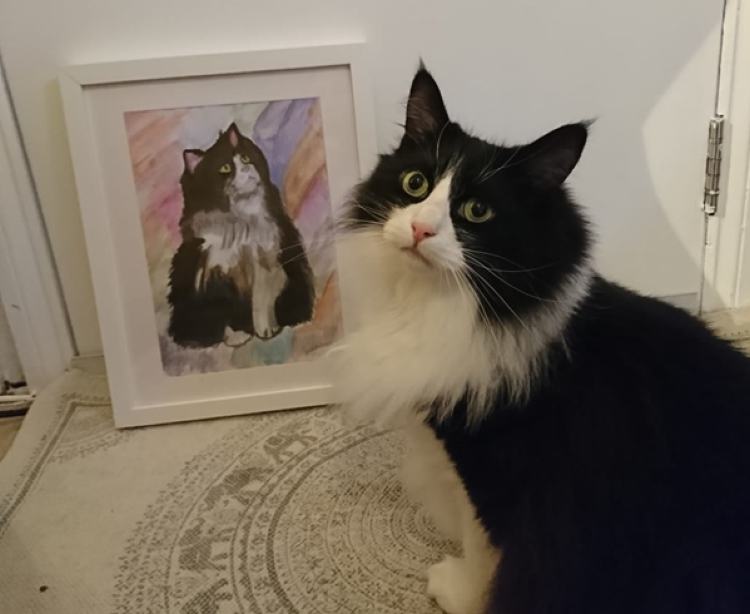
Self-awareness: Jess doesn't recognise herself in mirrors or in cute paintings—a shame but, unlike us, she doesn't get all insecure about her appearance (look at that wonky left-eye).
Animals react to the world around them. They accurately process information with respect to their environments all the time: spiders sense vibrations on their webs, various aquatic animals detect changes in pH levels, dogs respond to voice commands, parrots can replicate them, capuchin monkeys use tools to deshell nuts, and so on. But how do animals think to determine what course of actions to take? Can we study their behaviour to understand their thoughts?
Like animals, humans empirically learn about the world through sensual experiences but our ability to form knowledge through reason gives us an edge. Abstractly, we seem capable of gaining knowledge independently from experience, something which Immanuel Kant called a priori thought.
Either form of knowledge can be expressed in a compositional language, which combines words following individual meanings and governing rules. Such a capacity enables us to share information and teach one another. Many animals completely lack anything remotely close to these linguistic capacities. Still, are there languages to animals’ thoughts which help them process information about the world around them in a coherent way?

Jess' wildlife: Cardboard boxes are left open for Jess to crawl into; cats apparently like the comfort and security of enclosed spaces. This begs the question: is there a meaningful difference in her mind between a box and a bush (or between fiction and reality in ours)? The boxes provide her with the kind of stimulation she would receive in 'nature', whatever that means: she naturally prefers processed food and spends most of her day sleeping on the sofa. For a variety of tasks I closely watch Jess and try to make sense of how she thinks. For example, she tries to figure out how to sit on me when I'm sat diagonally on the bed (usually she fails); I see the cogs turn as she contemplates her options, spinning around in circles, jumping up and down. Though I know she can't think in English, I imagine being drunk or younger or stupider to orientate my thinking to hers. But while it's true that none of us—drunk, stupid, or young me and normal Jess—can fit a key into lock and all of us can make it home, our cognition just isn't the same.
Cognitive scientists largely accept that many animals are minded. They claim that animals respond to physical changes in their environments and experience them sensually (e.g. through pain and pleasure and other more- and less-sophisticated mental states). However, many are overly keen to capture humanlike capabilities in animals (e.g. ‘empathy’) and their conclusions are then liable to being further misconstrued in media. I’ve seen many popular figures be more than happy to offer misdirected and overtly anthropocentric explanations of animal behaviour: the Great Barrier Reef was ‘stressed’ (it was more prone to death), a kangaroo ‘mourned’ the death of his mate (he wanted to have sex with her), and two ‘blobs’ of a slimy fungus were able to ‘teach and learn from one another through the transmission of knowledge’ (they shared blob space).
The language in these example contrasts with reductive, ‘killjoy’ explanations, which are more grounded in the physical world but may mask actual similarities. In this way animals are frequently placed into one of two metaphorical boxes when scientists devise hypotheses: they are either ‘stimulus-response machines’ or they are ‘agents with beliefs and desires’. And from searching for humanlike capabilities (‘comparative cognition’) many animals don’t meet the artificial bar constructed for them not to reach, meaning their cognition commonly gets underestimated.

A stimulus-response machine or a free-thinking agent with beliefs and desires? It's difficult to say.
The connecting point is that we should be careful with our language in describing animals. Yet, no matter where we are on the explanatory spectrum, physical sciences may always be incapable of capturing what it’s like to be other animals, from echolocating bats and colour-blind dogs to chilled-out turtles and weird, fluffy cats, from a first-person perspective—precisely the kind of thing most of us want to imagine! ‘If you could be any animal, what would you be?’ Redundant question! You can’t think like them. Even if we ramped down our thought and speech capacities to the levels of lower animals (in a process reminiscent of Hal’s deactivation in 2001: A Space Odyssey (1968): ‘Daisy, Daisy … ‘ ), we still couldn’t do so.

'Weeeaaahhh': Food is a battleground between me and Jess. In one corner: I smugly manipulate her into thinking she's had four meals when she's had two and two halves (hehe), a trick she cannot detect with her inferior cognition. But, just like one of Pavlov's dogs, she's conditioned to think she's hungry when the kitchen tap runs (as I wash up her bowl); so I shouldn't feel too smart. In the other corner: Jess manipulates me back! To signal her hunger (or unjustified desire for food) she rolls around on the kitchen floor and makes squeaky noises; and to signal her desire for yogurt or biscuits with her food she deploys a crafty and powerful silence in an evil attempt to make me yield to her desires. We're both pets because we train each other.
We may still be well-placed to describe aspects of animal thinking. Many philosophers argue that animals can freely form intentions mentally and act on them; represent situations and hold beliefs, even if they cannot express what they represent in propositional form; follow an internal language of thought featuring imagistic representational systems, such as diagrams or maps, to form knowledge; show semblances of beliefs; and deploy something akin to rationality to justify their intention to take one course of action over another.
Daniel Dennett, inspired by H.P. Grice’s theory of meaning, claims that animals possess beliefs which they communicate through vocalised intentions. But they must be capable of holding third-order beliefs (e.g. I think that she thinks that I think). Take an alarm call of chimpanzees: this expresses knowledge of danger and functions as a warning to others.
Chimpanzees, C, then, may think or believe or intend. And, unequipped with rationality, self-awareness, a compositional language, or anything so complex going on as ‘metacognition’ or ‘second-order’ reflective reasoning, the following may still be true:
- C desires safety.
- C believes X is a threat to the group.
- C intends to climb up a tree and express distress.
Philosophers and scientists, such as Frans de Waal, even argue that animals possess the rudiments of morality; else where did morality come from (assuming it exists at all)? Exemplified:
- C1 thinks it's unfair that C2 received an additional banana today.
But, again, since we’re unable to properly attribute content to chimpanzees’ mental states—what it is they’re thinking—the debate is forever labelled: ‘To be continued’.
Love
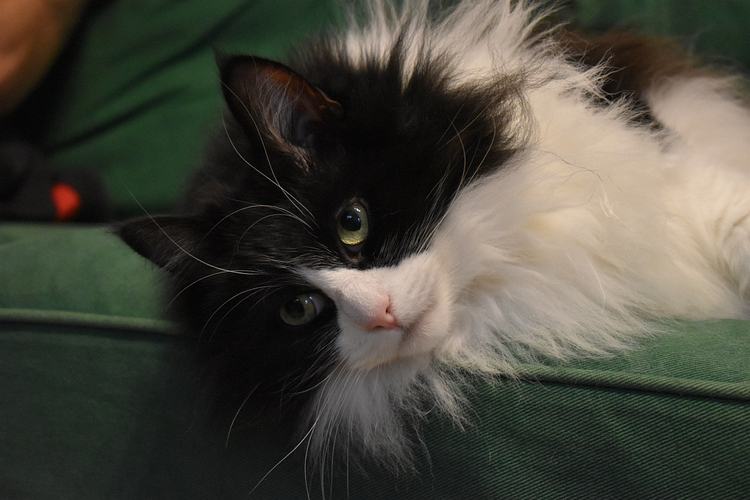
Jess on romance: Does Jess 'love' me? Is she 'happy'? Can I understand what she really 'wants'? Can she 'understand' what she really wants? How does she make decisions, if at all? What makes her her? Is her mind greater than a vast composition of cells, programmed by nature to randomly 'decide' certain actions and interact with other compositions of cells in a 'social' way for her own benefit? Simply acting out her nature-born desires (instincts) through self-preservation, without acting above them, would render the intimate bond I've imagined between us imaginary. Tell me there is more to our relationship than her dependency on me to feed her, the comfiness of my legs, and my familiar scent.
I want to believe Jess is a being of her own volition, however simple her faculties are. I want to believe she has a personality and possesses characteristic, freely born preferences so I can faithfully respond to her. I don’t want to believe Jess is a wholly predictable creature, who is determined by her biology, nor do I want to see her as a random ‘machine’ of nature, where every possible action can be assigned a numerical possibility in a soulless world of numbers; where her contemplative powers of deliberation are merely drawn-out mechanisms of impulse.
Instead, I want bonds of meaning and intention, cemented into love. In a world often blighted by evil and sadness I find comfort in my relationships with animals, illusory or not; I always have done and I probably always will.
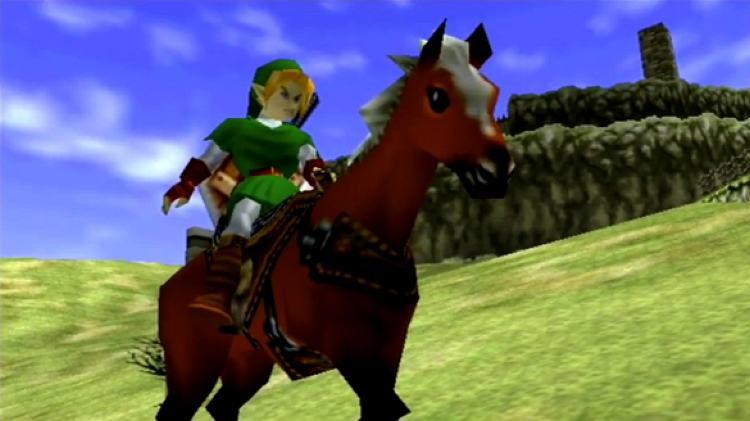
Happy bonds: Link rides his beloved horse, Epona, in The Legend of Zelda: Ocarina of Time (Nintendo 64). His song for her always moved me—as did Gandalf's awe of Shadowfax in The Lord of the Rings. Then there is Fry's love for his dog, Seymour, in Futurama, which deeply resonated with my being, The poignant episode 'Jurassic Bark', which is based on the story of Hachikō, a loyal Japanese dog who waited nine years for his dead owner to return from work—a story which was dramatised into a film in 2009—enveloped my teenage self with overwhelming feelings. But all these bonds—of loyalty and faithfulness; of love and respect—exist in my 'real life', too, through my relationships with domesticated and wild life.
Animals may or may not be conscious, they may or may not be free in their actions, they may process information robotically, and their love may or may not be indistinguishable from their fundamental biological drives; but, nevertheless, I am in awe of the animal kingdom; and, as we continue to learn about animals, humanely, we can continue to learn about ourselves through our origins.
We may have evolved to be friendly but we often spite these potential origins with our treatment of lower animals. We continue to advance our civilizations’ knowledge at the cost of our planet: we are by far the most-murderous and polluting denizens to have inhabited it. And I, for one, believe animals—not just pets and the magnificent—deserve many more rights.
Science and philosophy help us define animals’ needs and even provide us with reasons for keeping them. But we don’t require reason to form meaningful relationships. Indeed, my own awareness is limited, my own freedom is illusory, and my cognition is slow but, if these bonds of value stay intact, my love will always be as I remain faithful in ‘love’, however I see it, back.

A typical scene at The Human Front.
